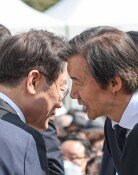Ruling party pushes to abolish veto right of opposition party
Ruling party pushes to abolish veto right of opposition party
Posted November. 20, 2020 08:07,
Updated November. 20, 2020 08:07
As the third meeting to nominate candidates for the head of the Corruption Investigation Office for High-ranking Officials (CIO) failed to reach an agreement, the Democratic Party of Korea announced a plan to push for a law revision to abolish the veto right of the opposition party by the end of this year. A failed nomination agreement merely after three meetings is leading to a potential change of how the head of the CIO is selected, which is the foundation of the CIO system.
The ruling party is blaming the failed agreement on the People Power Party, saying that not only a candidate recommended by Minister of Justice Chu Mi-ae but also candidates proposed by the head of the National Court Administration and the president of the Korean Bar Association were not accepted. However, the nomination process has revealed some challenges as those who have the capabilities and impartiality necessary for the position refused their nominations due to conflicts and controversies surrounding the CIO. Even though nominations were made after some struggle, the nominators should reflect on whether the nominees are suitable for the position.
The first head of the CIO will be in charge of recruiting the CIO’s prosecutors and investigators. Depending on who leads the CIO initially may determine the nature of the office, which warrants careful attention in the first appointment. There is no reason to hurriedly launch the CIO before the end of this year. If the ruling and opposition parties cannot agree among the current candidates, new candidates can be nominated so that both parties can agree on a nominee they can trust.
The stipulation of the veto right is the commitment of all parties involved in decision-making to be patient and come up with an agreement, albeit time-consuming. Without the opposition party’s consent, the head of the CIO cannot be nominated. Both parties and the public understand that such a complicated and time-consuming process is the minimal tool to ensure the political neutrality and independence of the CIO. It is self-contradictory to turn a blind eye and eliminate the final measure to grant legitimacy to the CIO.
The Democratic Party of Korea already made a change for the worse before the CIO act takes effect. In the case of the prosecution or the police conducting an investigation based on intelligence regarding a high-ranking official’s corruption, the head of the CIO should be notified of such investigation and the case should be referred to the CIO upon the request of the head of the CIO. This revision alone is causing more concerns, compared to when the CIO act was first passed by the National Assembly, regarding the lack of checks and balances among investigation agencies. The abolishment of the opposition party’s veto right on top of it is the destruction of the reasons for the CIO’s existence and the deception of the public.







